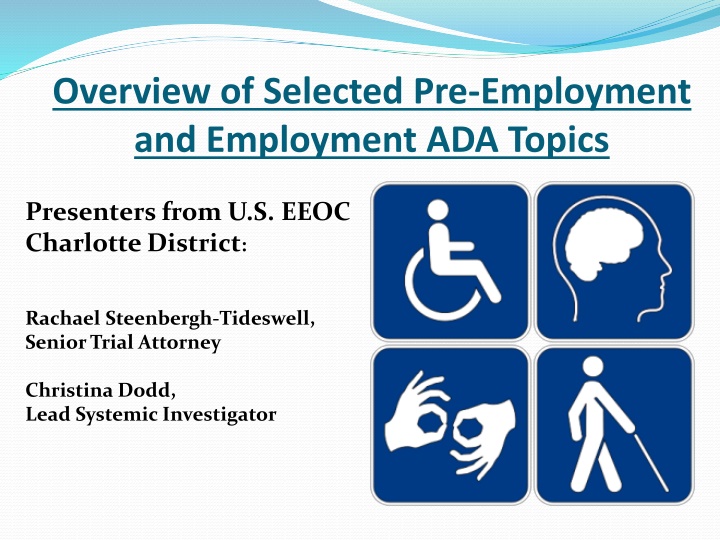
ADA Employment Guidelines for Individuals with Disabilities
Explore key ADA employment topics including the definition of a qualified individual with a disability, Title I of the ADA, confidentiality requirements, and pre-employment considerations as outlined by the U.S. EEOC. Learn how the ADA prohibits discrimination and ensures equal opportunities for qualified individuals with disabilities in the workplace.
Download Presentation

Please find below an Image/Link to download the presentation.
The content on the website is provided AS IS for your information and personal use only. It may not be sold, licensed, or shared on other websites without obtaining consent from the author. If you encounter any issues during the download, it is possible that the publisher has removed the file from their server.
You are allowed to download the files provided on this website for personal or commercial use, subject to the condition that they are used lawfully. All files are the property of their respective owners.
The content on the website is provided AS IS for your information and personal use only. It may not be sold, licensed, or shared on other websites without obtaining consent from the author.
E N D
Presentation Transcript
Overview of Selected Pre-Employment and Employment ADA Topics Presenters from U.S. EEOC Charlotte District: Rachael Steenbergh-Tideswell, Senior Trial Attorney Christina Dodd, Lead Systemic Investigator
A Brief Introduction to Title I of the Americans with Disabilities Act of 1990 ( ADA ) 2
Title I of the ADA Prohibits private employers with 15 or more employees, State and local governments, employment agencies and labor unions from discriminating against qualified individuals with disabilities in job application procedures, hiring, firing, advancement, compensation, job training, and other terms, conditions, and privileges of employment. Amended by the ADA Amendments Act of 2008 ( ADAAA ), which made it easier for an individual to establish that s/he is disabled 3
Who is a qualified individual with a disability ? A person will meet the disability prong if s/he: Has a physical or mental impairment that substantially limits one or more major life activities; Has a record of such an impairment; or Is regarded as having such an impairment 4
Who is a qualified individual with a disability ? A person will meet the qualified prong if s/he: Satisfies the requisite skills, education, experience, and other job-related requirements of the employment position that the individual holds or desires, and Can perform the essential functions of such position with or without reasonable accommodation 5
ADAs Confidentiality Requirements The ADA requires employers to treat any medical information obtained from employees as a confidential medical record. This includes information obtained from: A disability-related inquiry or medical examination Voluntary health or wellness programs Voluntarily disclosed by an employee The interactive process 6
ADA Protections for Applicants ADA offers protections during the hiring process, including: Prohibiting discrimination based on disability, and Requiring reasonable accommodation during the hiring process 8
What Can Employers Do and Not Do During the Hiring Process? Deny hire to an applicant who is unable to perform all essential functions of the job, even with reasonable accommodation Deny hire to an applicant who is unable to perform minor duties that are not essential to the job Deny hire to an applicant whose disability poses a significant risk of substantial harm to applicant or others, only after conducting a thorough assessment of the level of risk and the nature of the harm Deny hire to an applicant based on a slightly increased risk of harm, speculation about future risk, or generalizations about applicant s disability 9
What Can Employers Do and Not Do During the Hiring Process? Ask whether an applicant needs a reasonable accommodation for the hiring process Ask all applicants whether they would need reasonable accommodation to perform the job Where an employer knows an applicant has a disability, ask whether the disability might pose difficulties for the individual in performing a specific job task. THEN employer may ask whether applicant needs reasonable accommodation to perform that task. If employer believes applicant with an obvious disability will need a reasonable accommodation, employer may ask applicant to describe or demonstrate how s/he would perform the job with or without reasonable accommodation 10
Medical Inquiries and Examinations Under the ADA, an employer's ability to make disability-related inquiries or require medical examinations is analyzed in three stages: pre-offer pre-employment (applicant) post-offer pre-employment (job offer) employment (first day or after)
Medical Inquiries and Examinations Pre-Offer: Prior to an offer of employment, the ADA prohibits all disability-related inquiries and medical examinations. What is a disability-related question? Any question that is likely to elicit information about a disability.
Pre-Offer Questions Are these questions likely to elicit information about a disability? Can you do this job with __ without __ reasonable accommodation? (Check One) Answer: Yes Do you currently use illegal drugs? Answer: No What medications are you currently taking? Answer: Yes Have you ever filed for Workers Compensation? Answer: Yes
Pre-Offer Questions Are these questions likely to elicit information about a disability? Can you perform the essential functions of this job with or without a reasonable accommodation? Answer: No How did you break your leg? Answer: No Have you ever been treated for drug addiction? Answer: Yes Have you ever been arrested for DUI? Answer: No
Medical Inquiries and Examinations Post-Offer Pre-Employment: An employer may ask disability-related questions and perform medical examinations only after a contingent job offer is made, and prior to the start of employment (post-offer pre-employment) if: all entering employees in the same job category are also subjected to the same inquiry and/or examination, regardless of disability; and medical information obtained is kept confidential.
Post-Offer Pre-Employment If an individual is screened out because of disability, the employer must show that the exclusionary criterion is job- related and consistent with business necessity. A disability-related inquiry or medical examination may be job-related and consistent with business necessity when an employer has a reasonable belief, based on objective evidence, that: (1) an employee's ability to perform essential job functions will be impaired by a medical condition; or (2) an employee will pose a direct threat due to a medical condition.
Medical Inquiries and Examinations Employment: An employer may not conduct medical inquiries or examinations on employees, unless the inquiries and/or examinations are job-related and consistent with business necessity. The ADA's restrictions on medical inquiries and examinations apply to all employees, not just those with disabilities. Any employee may challenge disability-related inquiries examinations that are not job-related and consistent with business necessity. and/or medical
Current Employees Once an employee begins the first day of work, including orientation, all disability-related medical inquiries and examinations are prohibited unless the employer can show such inquires/examinations are job-related and consistent with business necessity.
Current Employees Applying A current employee applying internally or externally for another job at his/her employer must be treated as an applicant. The employer is prohibited from making disability-related inquiries/examinations prior to a conditional job offer. A current employee s supervisor may not disclose disability-related information to the interviewing and/or hiring manager. 19
Harassment Based on Disability ADA protects against harassment based on disability Employee must show S/he is disabled within the meaning of the ADA; S/he was subjected to conduct or comments that either (a) are sufficiently severe or pervasive to alter the conditions of employment (hostile work environment), or (b) results in a tangible employment action There is a basis for holding the employer liable 21
Reasonable Accommodation ADA requires an employer to provide reasonable accommodation to an employee with a disability, unless doing so would cause an undue hardship Reasonable accommodation = any change in the work environment (or in the way things are usually done) to help a person with a disability perform the essential duties of a job or enjoy the benefits and privileges of employment 22
Reasonable Accommodation Examples: Making existing facilities accessible Job restructuring Part-time or modified work schedules Acquiring or modifying equipment Changing tests, training materials, or policies Providing qualified readers or interpreters Reassignment to a vacant position 23
Reasonable Accommodation An employer does NOT need to: Eliminate an essential function (i.e., a fundamental duty) of the position Provide the employee s preferred accommodation Lower production standards that uniformly apply to all employees Provide personal use items that the employee would require for accomplishing daily life activities off the job, such as a wheelchair or glasses Provide personal amenities that are not provided to all employees (e.g., refrigerator) 24
The Reasonable Accommodation Process Interactive Process Request Result 25
What Can an Employer Do During The Interactive Process? Ask relevant question to ensure the employer understands the request Ask relevant questions and request specific documents regarding the nature, extent, and duration of the disability and employee's functional limitations, if not obvious Request documents from a treating physician confirming that employee needs time off 26
EEOCs Systemic Program and Strategic Enforcement Plan 27
Systemic Investigations Systemic cases are pattern or practice, policy and/or class cases where the alleged discrimination has a broad impact on an industry, profession, company, or geographic location. 28
ADA Systemic Issues No-fault attendance policy No leave granted outside FMLA leave Maximum leave policy 100% healed policy Apply and compete for reassignment Unlawful medical inquiry/examination Qualification standards 29
Strategic Enforcement Plan Under Emerging and Developing Issues, EEOC is focusing on qualification standards and inflexible leave policies under the Americans with Disabilities Act. 30
If You Believe Your ADA Rights Have Been Violated. . . File a charge with EEOC, even if you are unsure a violation has occurred In South Carolina, you have 300 days after the date of the harm to file do not wait! If you do not timely file with EEOC, you cannot take your ADA case to court 32
How To File A Charge Use the EEOC Public Portal to Submit an Inquiry, Schedule an Appointment, and File a Charge Walk-in to an EEOC office File with South Carolina Human Affairs Commission Send signed letter via mail 33
What to Do If A Charge is Filed Against Your Business When a charge is filed against an organization, the EEOC will notify the organization within 10 days. The notification will provide a URL for the Respondent to log into the EEOC's Respondent Portal to access the charge and receive messages about the charge investigation. Use the Respondent Portal to: View Charge Upload Position Statement Update contact information 34
Electronic Notice of Charge Email notice replaces EEOC FORM 131 (Notice of Charge) View/download Charge of Discrimination at EEOC Respondent Portal via link and unique temporary password: 1. Access EEOC s secure online system: https://nxg.eeoc.gov/rsp/login.jsf 2. Enter this EEOC Charge No.: 436-2018-XXXXX 3. Enter this temporary password: pw7777ab 35
QUESTIONS? 37
Additional Resources EEOC s website: https://www.eeoc.gov/ EEOC s Disability Discrimination website EEOC Efforts for Veterans with Disabilities Inter-Agency Toolkit for Recruiting, Hiring, Retaining, and Promoting People with Disabilities The Americans with Disabilities Act: A Primer for Small Business 38






















